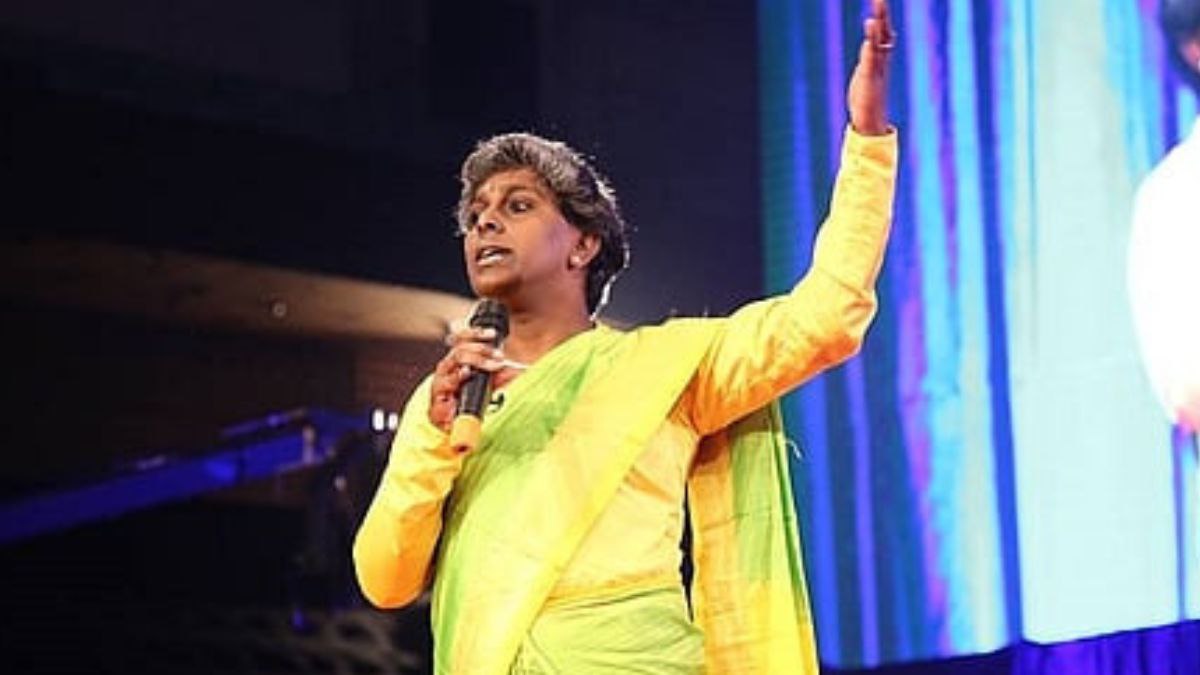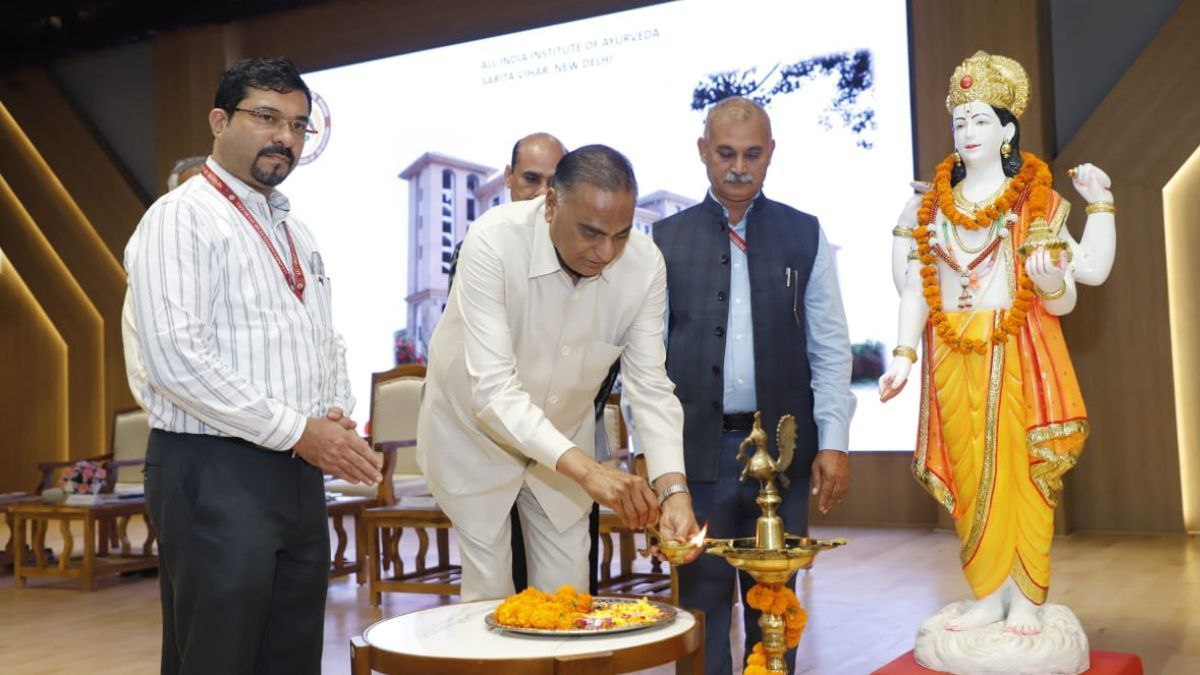In a landmark step for inclusivity and representation, Akkai Padmashali has become the first transgender person from Karnataka to be appointed to a Supreme Court–constituted committee. The panel, created to advise on equal opportunity and policy reforms for the transgender and gender non-conforming community, marks a turning point in the country’s slow but steady march towards social justice. Padmashali’s appointment is more than symbolic—it is a testament to her decades-long struggle for dignity, rights, and equality in a society that long refused to see her. Her new role signals change is no longer just demanded—it is being enacted.
From Margins to Milestones: Akkai’s Journey of Resistance
Born in Bengaluru, Akkai Padmashali faced societal rejection early in life. Disowned by family, forced to quit school, and driven to despair, she endured discrimination not only from society but from systems meant to protect. Yet, she emerged from personal tragedy to become one of India’s fiercest voices for LGBTQIA+ rights. A suicide survivor at age 12 and later a sex worker, Padmashali turned her trauma into activism. She began her journey with Sangama, a rights-based organisation, before founding Ondede, which works on intersectional rights. Her life is a case study in how courage and community can overcome systemic exclusion.
Padmashali’s selection to the panel also brings to the fore a critical issue that many mainstream discussions overlook: the absence of community voices in policymaking. For decades, decisions affecting transgender individuals were made without consulting those directly impacted. This exclusion has led to legislation and welfare schemes that often fall flat, either because they fail to reflect lived realities or because they are rooted in outdated assumptions. With Padmashali now embedded within one of the country’s highest-level advisory bodies, there is a unique opportunity to reverse that legacy—to build policies informed by experience rather than just observation or intent.
What makes Padmashali’s rise even more significant is the intersectional lens she brings. Her activism has never been confined solely to gender identity; she has long spoken about the interconnected challenges faced by people based on caste, class, religion, and disability. This perspective is crucial because transphobia does not exist in isolation—it overlaps with other forms of marginalisation. A Dalit trans woman in a rural area, for example, experiences discrimination differently from an urban, upper-caste trans man. By emphasising these layers, Padmashali’s voice ensures that the panel’s recommendations will address structural inequalities, not just individual vulnerabilities or legal gaps.
In public forums and interviews, Padmashali has continually expressed that the goal of her activism is not charity or sympathy, but systemic change rooted in dignity and rights. This shift in narrative is powerful—it moves away from the idea of trans people as victims in need of rescue and toward a vision of them as equal citizens deserving structural support. Her critiques of the 2019 Transgender Act, which she and others described as regressive and exclusionary, are grounded in this same logic. Her role in the committee now gives her the platform to help rewrite policies from that very ideological standpoint.
The timing of this appointment is also key. India is witnessing a resurgence of identity-based discourse, both in civil society and in law. Debates around gender, queerness, and bodily autonomy are no longer peripheral—they are entering the mainstream. In this context, Padmashali’s presence on the committee ensures that the conversation does not get hijacked by academic or elite frameworks. Her activism has always centred people on the margins: sex workers, homeless trans individuals, and those excluded even from queer spaces. Her input may therefore act as a necessary course correction, ensuring policy does not become elitist or disconnected from reality.
It is also worth noting the message this sends to institutions, especially at the state and municipal levels. Local bodies often mirror national inertia or prejudice when it comes to implementing inclusion measures. With a trans activist now advising the highest court in the land, the pressure may cascade downward. Karnataka, in particular, could become a testing ground for trans-inclusive urban policy, public employment, and shelter programs. Padmashali’s prior work in Bengaluru gives her an intimate understanding of these systems, and her new authority might compel bureaucracies to finally listen—and act. The gap between intent and execution could finally begin to close.
Ultimately, Akkai Padmashali’s story is not only about her but about a movement that refused to be silenced. Her elevation is a collective win for every transgender person who has stood in protest, who has educated policymakers, and who has simply survived in a society stacked against them. While much remains to be done—laws to be amended, stigma to be dismantled, lives to be protected—this moment is a landmark in that ongoing journey. Her appointment signals that the highest echelons of justice are finally beginning to recognise that those at the margins are not just recipients of policy but essential architects of it.
In 2015, Padmashali became the first transgender person to receive the Karnataka Rajyotsava Award, the state’s second-highest civilian honour. She also became the first transgender woman in the state to legally marry under the Special Marriage Act. Her TED Talks, university lectures, and public policy contributions have since made her a recognised public intellectual. Despite this, she has frequently called out tokenism, underlining that trans persons are still fighting for basic access to employment, education, and housing. Her fight has never been for visibility alone—it has always been rooted in dismantling the structures that keep trans lives precarious.
Supreme Court Committee: Role, Impact, and What It Means
The Supreme Court’s decision to form a committee focused on transgender inclusion in jobs, education, and healthcare marks a significant judicial intervention. Headed by former Delhi High Court judge Asha Menon, the panel includes jurists, civil society members, legal experts, and now, for the first time, people like Akkai Padmashali and Grace Banu—transgender activists with lived experience. Their inclusion ensures the committee won’t merely offer theoretical advice but will present grounded realities faced by the community. The aim is to create practical frameworks for affirmative action, inclusive medical care, and dignified institutional practices, especially for those still navigating daily marginalisation.
Padmashali’s participation is critical. Her on-the-ground experience in advocacy and her policy acumen position her to be an effective voice for grassroots issues. She understands not only the structural failures but also the cultural undercurrents that fuel discrimination. Her presence means that when policies are drafted, the voices of street-level transgender persons—those without documents, shelter, or family—are represented. This appointment also strengthens the legitimacy of community-led reform, making clear that trans persons are not only subjects of welfare but architects of justice. It moves India closer to a model where governance includes—not just observes—marginalised communities.

Inclusion, Not Just Integration: The Broader Social Lens
Though the 2014 NALSA judgment by the Supreme Court recognised transgender persons as a “third gender” and granted them constitutional rights, implementation has remained uneven. Trans persons continue to face systemic discrimination, particularly in employment, healthcare, education, and housing. Public apathy, bureaucratic delay, and cultural stigma persist. Padmashali’s appointment reflects the beginning of a shift—from symbolic court victories to structural transformation. However, she herself has emphasised that change must go beyond policy papers. What is needed, she argues, is cultural literacy: society must unlearn prejudice, and institutions must remove the daily hurdles trans persons face in accessing rights already granted.
Padmashali has frequently stated that “identity without dignity is meaningless.” Her advocacy calls attention to how trans persons are still forced into begging and sex work due to economic exclusion. The very legal recognition that granted rights has not translated into jobs or protection from violence. Now, as part of the SC-appointed committee, she will push for reforms rooted in justice, not charity. Whether that’s pushing for reservation in education and employment, access to trans-friendly healthcare, or zero-discrimination policies in the private sector, her presence ensures the committee will be judged not just by what it recommends, but by what it delivers.
A Moment for Karnataka—and for India
Akkai Padmashali’s appointment is a milestone not just for her, but for Karnataka and the larger LGBTQIA+ movement in India. For decades, Karnataka has been home to strong transgender activism—from street protests to policy forums—but institutional representation remained elusive. Her entry into a Supreme Court–backed national committee changes that. It affirms that the fight for equality is not region-bound; voices from the South are equally shaping the national discourse. It also signals to young queer individuals in small towns and cities that visibility is possible, and that dignity is not a privilege, but a right worth fighting for.
Representation at this level has a ripple effect. It influences policymaking, drives media coverage, and shapes educational narratives. Young people growing up questioning their identity now have role models not just in activism but in governance. Padmashali’s presence on the panel serves as a reminder that justice must be participatory to be effective. It also signals to other state governments and central agencies that trans inclusion is not optional—it is necessary for democracy to be meaningful. The impact of her role will not just be seen in reports and recommendations, but in lives changed, policies enacted, and injustices corrected.
The Work Ahead: Structural Reform, Not Surface Change
Despite this powerful moment, the work ahead remains daunting. India’s Transgender Persons (Protection of Rights) Act, 2019, has faced criticism for being top-down, paternalistic, and failing to involve the trans community during its drafting. Many activists have called for the law to be repealed or amended significantly. Padmashali’s involvement in the SC panel could help create parallel frameworks that actually work—based on what the community needs rather than what bureaucrats assume. From job quotas to trans hostels to gender-affirming healthcare, there are a range of demands that have remained unmet, and this committee could finally push them forward.
Akkai has often warned against the dangers of visibility without support. She has said that being “seen” without being “heard” leads to further marginalisation. For the Supreme Court panel to be effective, it must not merely symbolise change—it must institutionalise it. That means budget allocations, accountability mechanisms, time-bound goals, and measurable impact. Anything less would be a repetition of past failures. For now, however, her appointment stands as a rare moment of hope—a moment when the highest court in the land has recognised that justice must be guided by those who’ve most needed it, and long been denied it.

Conclusion
Akkai Padmashali’s appointment to the Supreme Court’s expert panel is not just a personal victory or a state achievement—it is a national moment of reckoning. It reminds us that justice delayed can still be achieved through persistence, protest, and participation. It also tells the country that transgender persons are no longer content being written about in policy—they are now writing it. The real legacy of this moment will depend on the changes that follow. But for now, it stands as proof that progress is possible—and that in the fight for equality, some battles are being won.
Follow: Karnataka Government
Also read: Home | Channel 6 Network – Latest News, Breaking Updates: Politics, Business, Tech & More

